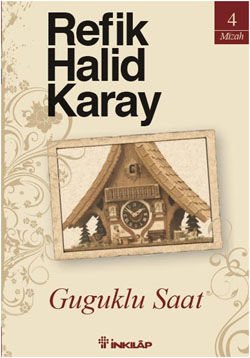
Guguklu Saat
Cuckoo Clock: "When you wake up in the morning, you relax by fishing by stretching a reed into the sea from where you are. Baskets for lobsters are inspected, or roses are pruned in the garden. Then, when it gets hot, you go in immediately, a table is set up on the wide marble stony area below, and fresh fish are served." Fresh from the pan, its aroma fills your lungs, you eat it with appetite. Coffee, cigarettes and sleep... Now you are in the back room, on the side that does not see the sun, a wind coming from the Bosphorus and cooling in the sea comes in from the side window and gently inflates your mosquito net, you sleep soundly. After this, you go down to the boathouse and swim in the sea. I think this is the ideal life in the summer." - Refik Halid Karay
Refik Halid Karay, who describes his observations of social events and people in Cuckoo Clock by combining them with his rich Turkish and ironic narration, includes the reader in his colorful, sincere and enjoyable conversation, enters different environments with the author and meets interesting people throughout the conversation.
About the Author: Refik Halid, who was born in 1888 in Beylerbeyi as the son of Serveznedar Mehmed Halid, is from the Crimean Giray family on his mother's side; His father's side is from the Karakayış family, a branch of which migrated from Mudurnu to Istanbul in the late 18th century. The writer, who studied at "Galatasaray Sultanisi" and "Mekteb-i Hukuk", started journalism during the Constitutional Monarchy. He quickly became famous with his satirical writings and became one of the founders of the "Fecri Âti" literary group. As a result of the satires and political articles he wrote under the name "Hedgehog", he was exiled for five years in various provinces of Anatolia by the Union and Progress government, but was able to return to Istanbul in the last year of World War I. Upon his return, Refik Halid worked as a teacher at Robert College, as editor-in-chief of Sabah newspaper, and as General Manager of Post-Telegraph twice, and during this period he published the humor magazine "Aydede".
The writer, who had to leave the country due to his political writings and views, settled in Aleppo and contributed to connecting Hatay to Turkey with his articles and works in the "Vahdet" newspaper he published. Refik Halid, who returned home in 1938, wrote daily articles in magazines and newspapers and wrote about 20 novels.
Refik Halid, who carries the time period from the Constitutional Monarchy to the Republic in his works of different genres with his strong observation ability and the richness of his language, describes the reality of Anatolia in Homeland Stories; In his works such as Homeland Stories and Exile, he brought together deep longing for his homeland with literature. In the author's humorous works such as Ago Pasha's Memoirs and What the Hedgehog Said; In his chronicles such as A Fistful of Nonsense and Woman with Make-up; In his memoirs titled Minelbab İlelmihrab and A Lifetime, his versatile and colorful narration enables him to illustrate the social-political environment. In his novels such as Anahtar, Nilgün, Two-Body Woman, Lover of 2000 Years, and Today's Palacelisi, he combines his descriptive talent and creativity in gripping fictions, and deals with individual relationships in general and male-female relationships in particular, in depth in space-time dimensions, and focuses on the periods and places in which the novels are set. It enriches its narrative by including fine details.
Author Refik Halid, who died in Istanbul on 18.7.1965, is one of the most powerful names in Turkish literature with the sharpness of his opposition pen, clean Istanbul Turkish, colorful expression, power of description and creativity.
Number of Pages: 192
Year of Printing: 2010
Language: Turkish
Publisher: İnkılap Kitabevi
First Printing Year: 2010
Language: Turkish
| Publisher | : | Revolution Bookstore |
| Number of pages | : | 192 |
| ISBN | : | 9789751030269 |
| The heart | : | Turkish |


